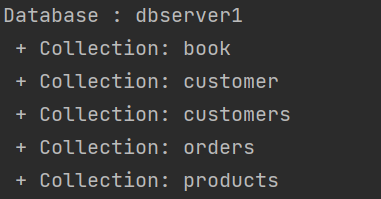2022. 4. 14. 17:38ㆍ[DB]/[MongoDB]_DB
목표]
순수 java로 Mongodb 에 연결하여 데이터를 읽고, 쓰기
Tool : Intellij
DB : MongoDB
빌더 : Maven
Intellij로 Maven 프로젝트를 하나 만듭니다]

2. Pom.xml 에 Dependency 추가
<dependency>
<groupId>org.mongodb</groupId>
<artifactId>mongo-java-driver</artifactId>
<version>3.4.1</version>
</dependency>3. 자바 파일 2개 생성

4. Mongodb 에는 연결을 하고 Collection 객체를 반환하게 만들었습니다.
ublic class Mongodb {
public DBCollection collection;
// 콜렉션 객체 반환
public DBCollection selectMongo(){
return collection;
}
public Mongodb() {
//생성자 호출과 동시에 연결
//접속정보
String MongoDB_IP = "localhost";
int MongoDB_PORT = 27017;
String DB_NAME = "admin";
String Databasename = "inventory";
String user = "debezium";
char[] pw = {'d','b','z'};
MongoCredential credential = MongoCredential.createCredential(user,DB_NAME,pw);
//connect to db
MongoClient mongoClient = new MongoClient(new ServerAddress(MongoDB_IP,MongoDB_PORT), Arrays.asList(credential));
List<String> database = mongoClient.getDatabaseNames();
System.out.println("=====Database List===== ");
int num =1 ;
for (String dbName : database) {
System.out.println( num + ". " + dbName);
num++;
}
DB db = mongoClient.getDB("inventory");
Set<String> collections = db.getCollectionNames();
System.out.println("Database : " + Databasename);
for (String colName : collections) {
System.out.println(" + Collection: " + colName);
}
DBCollection collection = db.getCollection("book");
this.collection = collection;
}
}접속정보 부분]
//접속정보
String MongoDB_IP = "localhost";
int MongoDB_PORT = 27017;
String DB_NAME = "admin";
String Databasename = "inventory";
String user = "debezium";
char[] pw = {'d','b','z'};MongoDB_IP -> mongodb 의 IP주소
MongoDB_PORT -> mogodb를 연 포트 번호
DB_NAME -> user가 위치한 db이름
Databasename -> DB 의 이름
String user -> 접속할 유저 아이디
char[] pw -> 접속할 유저 비밀번호
접속 설명]
MongoCredential credential = MongoCredential.createCredential(user,DB_NAME,pw);
//connect to db
MongoClient mongoClient = new MongoClient(new ServerAddress(MongoDB_IP,MongoDB_PORT), Arrays.asList(credential));
MongoCredential 을 통해서 해당 유저가 어느 디비에 무슨 유저인지 확인합니다
-> 별도로 지정 안하면 빼도 됩니다.
MongoClient 에서 서버 주소와 포트를 넣고
위에서 유저정보를 불러온 값을 이용해서 MongoClient 를 생성합니다.
MongoDB의 Database들 확인]
List<String> database = mongoClient.getDatabaseNames();
System.out.println("=====Database List===== ");
int num =1 ;
for (String dbName : database) {
System.out.println( num + ". " + dbName);
num++;
}DB의 이름을 불러옵니다.
실행화면]

DB 접근]
DB db = mongoClient.getDB("inventory");
Set<String> collections = db.getCollectionNames();
System.out.println("Database : " + Databasename);
for (String colName : collections) {
System.out.println(" + Collection: " + colName);
}MongoDB 는
database -> Collection -> Document -> Fields 구조입니다.
db 에 Inventory 라는 데이터베이스 이름을 찾고
그 안의 콜렉션을 출력합니다
실행화면]

콜렉션 접근]
DBCollection collection = db.getCollection("book");
this.collection = collection;이제 Database 에서 안에 있는 book 이라는 콜렉션에 접근합니다.
그리고 이를 반환합니다.
DB를 일정 주기별로 데이터 삽입 소스 코드]
public class KafkaMongoDBInsert {
public static void main(String[] args) {
Timer jobScheduler = new Timer();
TimerTask task = new TimerTask() {
Integer count = 0;
Mongodb mongo = new Mongodb();
@Override
public void run() {
String date = NowTimer();
String rand = RandomString();
count++;
Map<String, Object> documentMap = new HashMap<String, Object>();
documentMap.put("id", count);
documentMap.put("time", date);
documentMap.put("data", rand);
DBCollection collection = mongo.selectMongo();
collection.insert(new BasicDBObject(documentMap));
System.out.println("collection = " + documentMap);
}
};
jobScheduler.scheduleAtFixedRate(task, 1000, 3000);
}
public static String NowTimer() {
Date date = new Date();
SimpleDateFormat sdf1 = new SimpleDateFormat("yyyy-MM-dd HH:mm:ss");
String nowTime1 = sdf1.format(date);
return nowTime1;
}
public static String RandomString() {
String[] items = {"testdata1", "testdata2", "testdata3", "testdata4"};
Random rand = new Random();
String result = items[rand.nextInt(4)];
return result;
}핵심 기능]
Map<String, Object> documentMap = new HashMap<String, Object>();
documentMap.put("id", count);
documentMap.put("time", date);
documentMap.put("data", rand);
//Insert Data03
DBCollection collection = mongo.selectMongo();
collection.insert(new BasicDBObject(documentMap));아까 리턴받은 값이 mongo 입니다.
그전에 key와 value가 나누어진 map객체를 만들고
이를 각각 값을 집어넣습니다.
DBcollection을 이용해서 해당 콜렉션을 선택하고
여기에 insert 함수를 이용해서 값을 변환하여 넣어줍니다.
결과화면 ]

감사합니다.
'[DB] > [MongoDB]_DB' 카테고리의 다른 글
| [MongoDB]_Springboot 에 mongoDB연결 및 데이터 입력(_insert) (0) | 2022.04.17 |
|---|